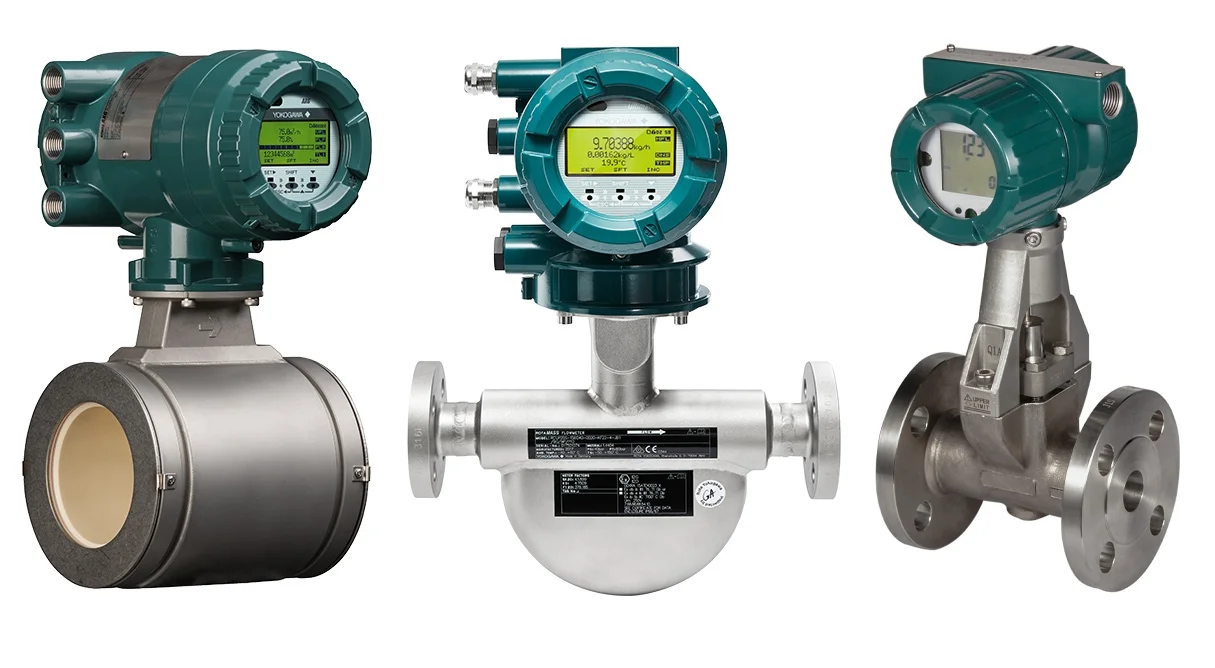Introduction
Flow meters are essential instruments across diverse industries, providing precise measurement of fluid flow critical for operational efficiency, safety, and compliance. With advancements in digitalization, IoT, and AI, flow meter technology is transforming rapidly, offering smarter, more accurate, and predictive solutions to meet modern industrial demands.
Industry Growth and Outlook
According to Straits Research, the global flow meters market size was valued at USD 8.29 billion in 2024 and is projected to reach from USD 8.77 billion in 2025 to USD 13.77 billion by 2033, growing at a CAGR of 5.80% during the forecast period (2025–2033). This steady growth reflects expanded adoption of smart, connected flow meters capable of real-time data acquisition—driven by sectors like oil and gas, water management, pharmaceuticals, and food processing.
Key Players and Competitive Analysis
Prominent manufacturers and innovators dominate the landscape:
-
Siemens (Germany): A leader offering advanced electromagnetic, Coriolis, and ultrasonic flow meters integrated with Industry 4.0 platforms for real-time monitoring and control.
-
Emerson Electric (USA): Known for its Rosemount line, Emerson focuses on digital Coriolis flowmeters used extensively in oil refining and chemical processing, increasingly augmented with AI for predictive maintenance.
-
Honeywell (USA): Provides precision flow measurement devices with enhanced diagnostics and wireless connectivity, supporting industries from aerospace to water treatment.
-
Yokogawa Electric (Japan): Renowned for durability and accuracy in magnetic and vortex flow meters, Yokogawa incorporates cloud connectivity and AI-driven analytics for near-zero downtime.
-
ABB (Switzerland): Offers smart ultrasonic and electromagnetic flowmeters with self-calibration and low power consumption, designed for sustainable industrial water and energy solutions.
-
KROHNE (Germany): Develops robust ultrasonic and Coriolis meters with IoT-enabled diagnostics, actively enhancing digital integration for process optimization in Europe and Asia.
-
Badger Meter (USA): Specializes in water management with its smart flow sensing technologies that enable precision leak detection and efficient resource usage.
-
Fuji Electric (Japan): Innovates mass flow and thermal flow meters for advanced industrial applications, integrating AI-enabled anomaly detection.
Country-Wise Updates and Technology Adoption
United States
US manufacturers lead in integrating AI and IoT-driven flow meters, with Emerson and Honeywell pushing connected devices that support remote monitoring and predictive maintenance. Adoption is strong in oil & gas, pharmaceuticals, and smart water networks.
Europe (Germany, Switzerland, UK)
Europe benefits from strong industrial automation, with Siemens, ABB, and KROHNE advancing energy-efficient, wireless, and self-calibrating flow meters. Sustainability trends are driving demand for meters that support emissions control and water conservation.
Japan and South Korea
Japanese firms Yokogawa and Fuji Electric emphasize high-precision, durable flow meters with integrated cloud diagnostics for heavy industry and smart manufacturing. South Korea is adopting hybrid ultrasonic and electromagnetic meters adapted for semiconductor and chemical sectors.
Asia-Pacific (China, India)
China's rapid industrial growth accelerates demand for cost-effective smart flow meters, with local manufacturers enhancing IoT and wireless capabilities. India’s expanding water treatment and oil refining sectors foster strong growth in digital metering and remote monitoring solutions.
Latin America and Middle East/Africa
These regions are integrating smart flow measurement primarily for water infrastructure and oil extraction. Investment in cloud-based monitoring is increasing, with manufacturers offering ruggedized and cost-efficient meter technologies tailored to local environmental conditions.
Emerging Trends in Flow Meter Technology
-
IoT Connectivity: Wireless flow meters equipped with LoRaWAN, NB-IoT, and Bluetooth enable remote control and real-time diagnostics, reducing operational costs and field visits.
-
Artificial Intelligence: AI algorithms analyze flow patterns to predict failures and detect anomalies early, enabling proactive maintenance and improved uptime.
-
Ultrasonic Flow Meters: Non-intrusive ultrasonics offer high precision with minimal maintenance, becoming popular for liquids where purity or contamination matters, such as pharmaceuticals and drinking water.
-
Smart Mag (Electromagnetic) Flow Meters: Enhanced electrode designs and self-calibration improve accuracy and reduce manual maintenance in wastewater treatment and chemical processing.
-
Energy Efficiency: Low-power consumption devices support sustainability initiatives in energy and water sectors, aligning with global carbon reduction targets.
-
Self-Calibrating Systems: Intelligent sensors automatically compensate for environmental changes, ensuring consistent data accuracy without manual recalibration.
-
Cloud-Based Analytics: Flow meters transmit data to centralized platforms for big data analytics, supporting digital twins and optimizing entire industrial processes remotely.
Recent News Highlights
-
Siemens launched next-gen ultrasonic flow meters integrated with AI-driven anomaly detection and cloud connectivity, targeting oil and gas and water utilities.
-
Emerson expanded its Rosemount Coriolis series with advanced diagnostics and reduced footprint designs, supporting petrochemical refineries and pharmaceutical manufacturing.
-
Yokogawa unveiled enhanced magnetic flow meters with corrosion-resistant coatings and real-time cloud monitoring for harsh industrial environments.
-
ABB introduced energy-efficient, self-calibrating ultrasonic meters aimed at smart city water networks to support global sustainability efforts.
-
KROHNE announced IoT sensor integrations improving predictive maintenance in chemical and food processing plants across Europe and Asia.
Tags
flow measurement, smart instrumentation, IoT sensors
Closing Summary
The evolution of flow meters is defined by the fusion of digital technology, AI, and IoT, fueling improvements in accuracy, remote monitoring, and operational efficiency. Global players like Siemens, Emerson, and ABB are pioneering innovations that meet the growing needs of diverse industries from water management to oil refining. As the adoption of smart flow meters expands worldwide, these instruments will become increasingly central to sustainable and automated industrial processes.Precision in Motion: Innovations and Growth in Flow Meter Technology
Introduction
Flow meters, critical devices that measure the rate of fluid movement, have become indispensable across industries such as oil and gas, pharmaceuticals, and water management. As digital transformation accelerates, the integration of AI, IoT, and cloud-based technologies is driving new levels of accuracy, efficiency, and predictive capability in flow measurement solutions.
Industry Growth and Outlook
According to Straits Research, the global flow meters market size was valued at USD 8.29 billion in 2024 and is projected to grow from USD 8.77 billion in 2025 to USD 13.77 billion by 2033, at a CAGR of 5.80% during the forecast period (2025–2033). This expansion is propelled by the rising adoption of smart flow meters that enable real-time data acquisition, remote monitoring, and predictive maintenance, particularly in sectors that demand precision and compliance.
Key Players and Competitive Landscape
Industry leaders continue to push the boundaries with advanced technologies:
-
Siemens (Germany): Offers state-of-the-art electromagnetic, ultrasonic, and Coriolis flow meters integrated with Industry 4.0 capabilities for enhanced automation and monitoring.
-
Emerson Electric (USA): Its Rosemount Coriolis flowmeters are widely used, featuring AI integration for predictive diagnostics and efficiency gains in oil refining and chemical processes.
-
Honeywell (USA): Provides flow meters with wireless connectivity and advanced diagnostics used across aerospace, water treatment, and manufacturing industries.
-
Yokogawa Electric (Japan): Specializes in durable magnetic and vortex flow meters, supplemented with cloud-based analytics and AI to optimize operations.
-
ABB (Switzerland): Develops energy-efficient ultrasonic and electromagnetic flow meters with self-calibrating sensors to serve water and industrial energy markets.
-
KROHNE (Germany): Focuses on IoT-enabled ultrasonic and Coriolis meters, enhancing predictive maintenance capabilities for European and Asian industrial customers.
-
Badger Meter (USA): Known for precision water meters with smart leak detection technologies.
-
Fuji Electric (Japan): Advances in thermal and mass flow meters equipped with AI-powered diagnostics for industrial use.
Country-Wise Developments
United States
Manufacturers like Emerson and Honeywell lead in deploying smart meters that combine AI, wireless data, and real-time analytics, fulfilling critical demand in oil & gas, pharmaceutical, and water sectors.
Europe
Siemens, ABB, KROHNE, and others emphasize sustainable, low-energy meters integrated into smart grids and factory automation, reflecting stringent European environmental standards.
Japan and Asia-Pacific
Yokogawa and Fuji Electric maintain prominence with high-precision meters, supporting semiconductor, chemical, and manufacturing sectors. China and India increasingly adopt connected, cost-effective flow meters to upgrade infrastructure and industrial capability.
Latin America and Middle East/Africa
These regions advance flow meter adoption for water management and oil applications, favoring ruggedized devices suited for local conditions and remote monitoring.
Trends Driving Flow Meter Innovation
-
IoT-Enabled Devices: Flow meters with wireless protocols such as LoRaWAN and NB-IoT allow remote, real-time monitoring and management faster and more cost-effectively than legacy systems.
-
Artificial Intelligence: AI-enhanced meters detect flow irregularities and predict maintenance needs, reducing downtime and operational costs.
-
Ultrasonic and Magnetic Technologies: Non-intrusive ultrasonic meters and improved electromagnetic sensors offer high accuracy and reliability with minimal maintenance.
-
Energy Efficiency and Sustainability: Advances focus on reducing power consumption and enabling integration into green infrastructure projects.
-
Self-Calibrating Sensors: Innovations in automatic calibration reduce manual interventions, improving accuracy and operational continuity.
-
Cloud Analytics and Digital Twins: Data collected by flow meters feeds into cloud platforms, enabling digital twins for real-time system analysis and optimization.
Recent News Highlights
-
Siemens launched AI-integrated ultrasonic flow meters with cloud connectivity designed for oil and water industries.
-
Emerson’s Rosemount series expanded with enhanced digital diagnostics and compact designs for petrochemical and pharma users.
-
Yokogawa introduced magnetic flow meters with corrosion-resistant materials and IoT sensor integration for harsh environments.
-
ABB debuted energy-saving ultrasonic meters aimed at smart city water networks supporting global sustainability initiatives.
-
KROHNE enhanced IoT-enabled devices to improve predictive maintenance across food and chemical plants in Europe and Asia.




